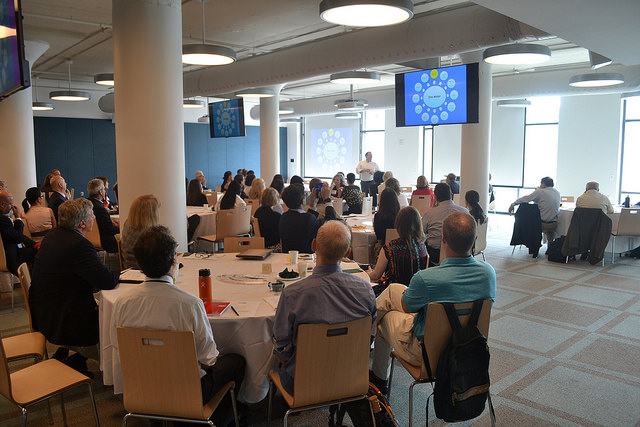Working Together to Upgrade New Jersey’s Water Infrastructure
On July 25, 2016, 90 people met at New Jersey City University to talk about water.
Not an ordinary meeting, it was the inaugural membership congregation of a cross-sector collaborative called Jersey Water Works – the latest milestone in more than two years of work by organizations to build a coalition to address the Garden State’s aging and inadequate water infrastructure.
The idea for Jersey Water Works began in early 2014, when the land-use policy organization New Jersey Future published a report highlighting the problems that antiquated combined-sewer systems cause in the state’s older cities and towns. Combined-sewer overflows are the most urgent of the water-infrastructure problems facing New Jersey communities, but there are a myriad of issues. New Jersey communities have some of the oldest water and sewer mains in the country – a few dating back to the Civil War – which means they’re prone to expensive leaks and breaks. Stormwater systems have not kept up with development or more intense rain events, exacerbating localized flooding; and New Jersey is unusual in that it has more, smaller water and sewer utilities than most other states, and these utilities may not have access to sufficient resources or expertise to manage their systems optimally.

Following publication of the report came a convening where experts from a variety of affected sectors – elected officials, public and private utilities, state regulators, and community organizations – laid out an ambitious Agenda for Change to address the combined-sewer problem and the broader problems of aging drinking water, wastewater, and stormwater systems.
“That meeting was the first time many of the attendees had been in the same room with each other,” said Mark Mauriello, a Former Commissioner of the State Department of Environmental Protection. “It was very energizing to see people working across sectors to develop innovative approaches to tackling this enormous problem.”
To achieve system-wide change, we needed a better way to offer shared leadership to our many new partners. We moved to a collective-impact approach to make it easier for everyone involved to align their efforts in a common direction.
–Chris Sturm, Managing Director of Policy and Water, New Jersey Future
In December 2015, the new collaborative, Jersey Water Works, was officially unveiled. New Jersey Future acts as the “backbone” organization, handling administrative, financial and logistical functions. Based on 12 shared goals, working groups have adopted priorities for action, and the collaborative is defining its measures of success so it can mark its progress.
“A strong collaborative approach is the only way to achieve smart, sustainable water infrastructure investments on the scale needed, which the EPA estimates at $40 billion over 20 years,” said Margaret Waldock, the program director for environmental programs at the Geraldine R. Dodge Foundation, which has provided funding for the initiative. “The project is a huge undertaking, but we’re already seeing results as Jersey Water Works engages new partners and gives them the space to work together.”

One of Jersey Water Works’ top priorities is addressing the combined-sewer systems that currently serve 21 cities across the state. The New Jersey Department of Environmental Protection (NJDEP) is requiring system operators to adopt and implement plans to reduce combined-sewer overflows, which will take many years and billions of dollars. The collaborative is working to find cost-effective and equitable ways to meet the new targets, and bring additional benefits to the affected communities. Those benefits will include installation of green infrastructure, which will make neighborhoods healthier and more resilient to a changing climate, ease pressure on the sewer systems, and provide jobs and job training to area residents.
The collaborative’s efforts are already making a difference–it established a new peer network to connect combined-sewer system permittees across the state. Part of what makes the combined-sewer overflow (CSO) issue complicated in New Jersey is that there are 25 different permit-holders–17 municipal sewer utilities and eight regional treatment plants. The group focused initial meetings on how to advance CSO projects more quickly through the NJDEP permitting process. The state regulatory agency is also a partner in the effort.
Convening CSO permit-holders allows us to learn from each other, and also share ideas on what kind of support we should seek from policymakers, regulatory agencies and other stakeholders
–Andy Kricun, Executive Director, Camden County Municipal Utilities Authority and permittee network co-chair
The collaborative’s Community Engagement Committee is working with the state Department of Environmental Protection, utilities, environmental, and community organizations to help ensure that a broad group of stakeholders have an opportunity to shape their communities’ water investments.
“Water infrastructure projects will be among our cities’ biggest public works expenditures, and community members must be involved to ensure that those projects are making our neighborhoods stronger and healthier,” said Drew Curtis, the Community Development and Environmental Justice Director at the Ironbound Community Corporation in Newark.
“The scope of the water problem in New Jersey is enormous,” said Christie Todd Whitman, the former New Jersey Governor and U.S. Environmental Protection Agency Administrator and an honorary co-chair of Jersey Water Works. She spoke at the inaugural meeting. “No one organization can fix it alone, but this membership meeting is a wonderful opportunity to look at the difference the collaborative has made already. You are all influencers, with the ability to motivate. Congratulations and don’t give up!”